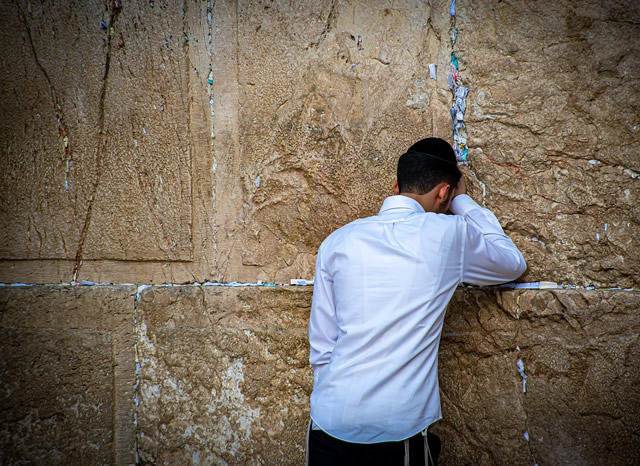
Israel’s past, as well as their present situation
“In those days there was no king in Israel, but every man did that which was right in his own eyes” (Judges 17:6).
The last three chapters of the book of Judges describe a dark time in the land of Israel. The Hebrews had forgotten that a few centuries ago, they received the Ten Commandments through Moses: “Thou shalt have no other gods before me” (Exodus 20:3). Chapter 17 reports of a man named Micah, who stole 1,100 shekels of silver from his mother, but then returned the money to her. What did they do with the money?
“Yet he restored the money unto his mother; and his mother took two hundred shekels of silver, and gave them to the founder, who made thereof a graven image and a molten image: and they were in the house of Micah” (Judges 17:4). Idolatry was prevalent; Israel had forgotten that the God of Abraham, the God of Isaac, and the God of Jacob had promised they would be a great nation who would bless all nations on planet earth.
In the next book, 1 Samuel, Israel collectively expresses their desire not to be special; rather, to be equal to all other nations: “…Now make us a king to judge us like all the nations” (1 Samuel 8:5b). Other translations read: “They have rejected me as their king.”
More than 3,000 years later, we read of the rejection in Luke 23:37-38: “…If thou be the king of the Jews, save thyself. And a superscription also was written over him in letters of Greek, and Latin, and Hebrew, This Is The King Of The Jews.”
These few verses paint a mighty prophetic panorama, clearly showing Israel’s election on the one hand, and their rejection on the other. Nevertheless, we must quickly add that God’s prophetic Word is not bound to circumstances; it does not depend on Israel’s behavior, whether good or evil, or their faith in the living God, the Creator of heaven and earth.
Before God destroyed Sodom and Gomorrah, we read these words in Genesis 18:18: “Seeing that Abraham shall surely become a great and mighty nation, and all the nations of the earth shall be blessed in him?”
Israel’s past, as well as their present situation and condition, in no way invalidates God’s eternal promises.
14 May 1948
Most of us are familiar with the various events which led to the declaration of the State of Israel on 14 May 1948. However, we must take careful notice that the proclamation of the State of Israel would have been impossible without the first, second, third, and fourth Aliyah (return of Jews to the Promised Land).
What is significant to point out is that God deals with today’s Israel in the opposite direction, as He did in the beginning: “And God spake all these words, saying, I am the Lord thy God, which have brought thee out of the land of Egypt, out of the house of bondage” (Exodus 20:1-2). Repeatedly, God intervened on Israel’s behalf supernaturally. He judged Egypt and led the nation through the wilderness for 40 years. During those years, Israel experienced—physically and literally—God’s direct, miraculous intervention on their behalf. Exodus 19:4 testifies: “Ye have seen what I did unto the Egyptians, and how I bare you on eagles’ wings, and brought you unto myself.”
Israel’s high point and glory was experienced under David’s son, King Solomon. Yet as we know from Scripture, Israel fell back into idolatry, which resulted in the destruction of the nation and the temple in 586 BC by Nebuchadnezzar, King of Babylon.
Almost 600 years later, Jesus made this prophecy about the second temple: “…See ye not all these things? verily I say unto you, There shall not be left here one stone upon another, that shall not be thrown down” (Matthew 24:2). That was fulfilled in 70 AD, when Roman forces destroyed Jerusalem and literally erased the temple on the Temple Mount. Literally not “one stone upon another” was left.
The return of the Jews to the land of Israel in modern times goes back to the 1800s. Here we must mention 29 August 1879, when 208 delegates and 26 press correspondents attended the first Zionist Congress in Basel, Switzerland. Here, Theodore Herzl proclaimed: “If I had to sum up the Basel congress in one word—which I shall not do openly—it would be this: at Basel, I founded the Jewish state. If I were to say this today, I would be greeted by universal laughter. In five years perhaps, and certainly in 50 years, everyone will see it.” Theodore Herzl did not see the fulfillment; he died 3 July 1904.
1st Aliyah (1882—1903)
About 35,000 Jews arrived in Israel, but almost half left the country within several years. The rest, some 15,000, established rural settlements primarily based on the communist principle of “kolkhoz” or kibbutz.
2nd Aliyah (1904—1914)
Another 35,000-40,000 Jews immigrated to Israel. Most of the arrivals were young people inspired by socialist ideas, who established the first kibbutz, Degania, in 1909. The majority originated from Eastern European nations.
3rd Aliyah (1919—1923)
Again, most arrivals during the 3rd Aliyah were young pioneers from Eastern Europe, numbering about 90,000 by the end of that period.
4th Aliyah (1924—1929)
Some 82,000 Jews arrived, mainly from the Soviet Union. Yet over 20,000 left for other countries. Incidentally, in 1929 Wall Street collapsed. That same year, the British “White Paper” restricted Jews from coming to Israel.
5th Aliyah (1929—1939)
In the period of 1933—1936, some 174,000 Jews settled in the country. By 1940, some 250,000 Jews had arrived, boosting the population to 450,000 in the land.
Moetzet HaAm
During the early years, political parties developed, of which 37 members were chosen by the Moezet HaAm (People’s Council). Virtually all were born, raised, and educated under communism in the former Soviet Union. Not surprisingly, the USSR was first to recognize the State of Israel on 17 May 1948. The United States followed with their de jure recognition, after the first Israeli election on 1 January 1949.
Israel Today
While Israel is the only functioning democracy in the Middle East, the present situation is all but chaotic. One reason is the numerous political parties that make up a coalition. While the present governing coalition consists of six main parties, there are a total of twelve different parties with seats in the Knesset (parliament). Israel is one of five nations without a constitution, the others being Canada, the UK, Saudi Arabia, and New Zealand.
If we analyze Israel’s situation based on media sources, it seems there is little hope for the country. However, that is not decisive; we as Bible-believers realize that God’s eternal resolution and His promises will stand, regardless of circumstance. The prophet Amos concludes his book with this verse: “And I will plant them upon their land, and they shall no more be pulled up out of their land which I have given them, saith the Lord thy God” (9:15). Finally, the King will be coming to Israel: “And his feet shall stand in that day upon the mount of Olives, which is before Jerusalem on the east…” (Zechariah 14:4a).
Midnight Call - 05/2023





